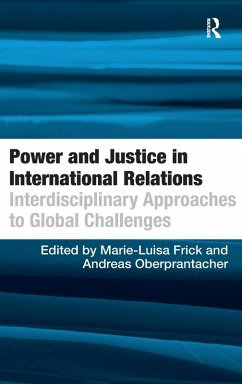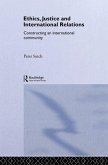Andreas OberprantacherInterdisciplinary Approaches to Global Challenges
Power and Justice in International Relations
Interdisciplinary Approaches to Global Challenges
Herausgeber: Frick, Marie-Luisa
Andreas OberprantacherInterdisciplinary Approaches to Global Challenges
Power and Justice in International Relations
Interdisciplinary Approaches to Global Challenges
Herausgeber: Frick, Marie-Luisa
- Gebundenes Buch
- Merkliste
- Auf die Merkliste
- Bewerten Bewerten
- Teilen
- Produkt teilen
- Produkterinnerung
- Produkterinnerung
Outstanding and thought-provoking, this book highlights the (unilateral) use of force in international relations, the chances and risks of international criminal justice, and the question of epistemic violence. It contributes to a better understanding of the relation between power and justice in view of current global tensions while reflecting the work of the internationally acclaimed philosopher Hans Köchler.
Andere Kunden interessierten sich auch für
![Redefining Regional Power in International Relations Redefining Regional Power in International Relations]() Miriam PrysRedefining Regional Power in International Relations176,99 €
Miriam PrysRedefining Regional Power in International Relations176,99 €![Religion, Politics and International Relations Religion, Politics and International Relations]() Jeff HaynesReligion, Politics and International Relations190,99 €
Jeff HaynesReligion, Politics and International Relations190,99 €![Ethics, Justice and International Relations Ethics, Justice and International Relations]() Peter SutchEthics, Justice and International Relations208,99 €
Peter SutchEthics, Justice and International Relations208,99 €![International Relations International Relations]() Peter SutchInternational Relations117,99 €
Peter SutchInternational Relations117,99 €![The Power of Cities in International Relations The Power of Cities in International Relations]() The Power of Cities in International Relations185,99 €
The Power of Cities in International Relations185,99 €![International Relations and Security in the Digital Age International Relations and Security in the Digital Age]() International Relations and Security in the Digital Age176,99 €
International Relations and Security in the Digital Age176,99 €![Competing Metaphors for International Relations Competing Metaphors for International Relations]() Riikka KuusistoCompeting Metaphors for International Relations178,99 €
Riikka KuusistoCompeting Metaphors for International Relations178,99 €-
-
-
Outstanding and thought-provoking, this book highlights the (unilateral) use of force in international relations, the chances and risks of international criminal justice, and the question of epistemic violence. It contributes to a better understanding of the relation between power and justice in view of current global tensions while reflecting the work of the internationally acclaimed philosopher Hans Köchler.
Produktdetails
- Produktdetails
- Verlag: Routledge
- Seitenzahl: 296
- Erscheinungstermin: 28. November 2009
- Englisch
- Abmessung: 240mm x 161mm x 21mm
- Gewicht: 611g
- ISBN-13: 9780754677710
- ISBN-10: 0754677710
- Artikelnr.: 42358110
- Herstellerkennzeichnung
- Libri GmbH
- Europaallee 1
- 36244 Bad Hersfeld
- gpsr@libri.de
- Verlag: Routledge
- Seitenzahl: 296
- Erscheinungstermin: 28. November 2009
- Englisch
- Abmessung: 240mm x 161mm x 21mm
- Gewicht: 611g
- ISBN-13: 9780754677710
- ISBN-10: 0754677710
- Artikelnr.: 42358110
- Herstellerkennzeichnung
- Libri GmbH
- Europaallee 1
- 36244 Bad Hersfeld
- gpsr@libri.de
Marie-Luisa Frick and Andreas Oberprantacher are senior researchers in the Department of Philosophy at the University of Innsbruck, Austria
Chapter 1 Introduction: A Man and his Quest for Global Justice Chandra
Muzaffar, Chandra Muzaffar; Part 1 Power Unleashed? The Use of Force in
International Relations and the Future of International Law; Chapter 2 From
a Unipolar to a Multipolar World: A Post-Bush US Presidency for a
Post-Western World, Anthony Carty; Chapter 3 Did Captain America Kill
International Law?, Chin Leng Lim; Chapter 4 Opting for Truth: The Roman
Catholic Church in International Affairs, Jodok Troy; Chapter 5 Difference
Arguments in International Law and Relations, Sienho Yee; Part 2 Conceptual
Disputes in Contemporary International Law; Chapter 6 Peace through Law
Revisited: Kelsen's Vision of International Law at the Beginning of the
Twenty-first Century, Andreas Th. Müller; Chapter 7 Post-Bellum War Crimes
Tribunals and Contemporary International Law: Adjudging State
Responsibility and "War Guilt" Issues, Edward McWhinney; Chapter 8 The
Concept of Human Security: Does it Add Anything of Value to International
Legal Theory or Practice?, Lyal S. Sunga; Part 3 Knowledge Production and
Epistemic Violence in International Relations; Chapter 9 The Epistemic
Violence of the International Security System in Africa, Belachew
Gebrewold; Chapter 10 Human Rights and the Challenges of Intercultural
Dialogue in the Twenty-first Century: A Perspective from Sub-Saharan
Africa, Michael O. Maduagwu; Chapter 11 Overcoming Cover-science in Latin
American Social Sciences and Humanities-An Intervention, Johannes Maerk;
Chapter 12 The Tyranny of the Status Quo: Economic Modeling, Economic
Policy Paradigms, and the Financial Crisis, Jesús Crespo Cuaresma; Part 4
Global Social Justice and the Question of Power; Chapter 13 International
Economics and the Question of Power: A Manifold but Obscured Relationship,
Andreas Exenberger; Chapter 14 Was Marx Right After All? A Critical
Analysis of the Global Financial Crisis, Elmar Altvater; Chapter 15
Capitalism vs. Ecology: Nature, too, Expects Justice!, Türkkaya Ataöv;
Chapter 16 Cooperation and Global Public Goods: Aspects of Fairness in
International Relations, Ulrich Metschl;
Muzaffar, Chandra Muzaffar; Part 1 Power Unleashed? The Use of Force in
International Relations and the Future of International Law; Chapter 2 From
a Unipolar to a Multipolar World: A Post-Bush US Presidency for a
Post-Western World, Anthony Carty; Chapter 3 Did Captain America Kill
International Law?, Chin Leng Lim; Chapter 4 Opting for Truth: The Roman
Catholic Church in International Affairs, Jodok Troy; Chapter 5 Difference
Arguments in International Law and Relations, Sienho Yee; Part 2 Conceptual
Disputes in Contemporary International Law; Chapter 6 Peace through Law
Revisited: Kelsen's Vision of International Law at the Beginning of the
Twenty-first Century, Andreas Th. Müller; Chapter 7 Post-Bellum War Crimes
Tribunals and Contemporary International Law: Adjudging State
Responsibility and "War Guilt" Issues, Edward McWhinney; Chapter 8 The
Concept of Human Security: Does it Add Anything of Value to International
Legal Theory or Practice?, Lyal S. Sunga; Part 3 Knowledge Production and
Epistemic Violence in International Relations; Chapter 9 The Epistemic
Violence of the International Security System in Africa, Belachew
Gebrewold; Chapter 10 Human Rights and the Challenges of Intercultural
Dialogue in the Twenty-first Century: A Perspective from Sub-Saharan
Africa, Michael O. Maduagwu; Chapter 11 Overcoming Cover-science in Latin
American Social Sciences and Humanities-An Intervention, Johannes Maerk;
Chapter 12 The Tyranny of the Status Quo: Economic Modeling, Economic
Policy Paradigms, and the Financial Crisis, Jesús Crespo Cuaresma; Part 4
Global Social Justice and the Question of Power; Chapter 13 International
Economics and the Question of Power: A Manifold but Obscured Relationship,
Andreas Exenberger; Chapter 14 Was Marx Right After All? A Critical
Analysis of the Global Financial Crisis, Elmar Altvater; Chapter 15
Capitalism vs. Ecology: Nature, too, Expects Justice!, Türkkaya Ataöv;
Chapter 16 Cooperation and Global Public Goods: Aspects of Fairness in
International Relations, Ulrich Metschl;
Chapter 1 Introduction: A Man and his Quest for Global Justice Chandra
Muzaffar, Chandra Muzaffar; Part 1 Power Unleashed? The Use of Force in
International Relations and the Future of International Law; Chapter 2 From
a Unipolar to a Multipolar World: A Post-Bush US Presidency for a
Post-Western World, Anthony Carty; Chapter 3 Did Captain America Kill
International Law?, Chin Leng Lim; Chapter 4 Opting for Truth: The Roman
Catholic Church in International Affairs, Jodok Troy; Chapter 5 Difference
Arguments in International Law and Relations, Sienho Yee; Part 2 Conceptual
Disputes in Contemporary International Law; Chapter 6 Peace through Law
Revisited: Kelsen's Vision of International Law at the Beginning of the
Twenty-first Century, Andreas Th. Müller; Chapter 7 Post-Bellum War Crimes
Tribunals and Contemporary International Law: Adjudging State
Responsibility and "War Guilt" Issues, Edward McWhinney; Chapter 8 The
Concept of Human Security: Does it Add Anything of Value to International
Legal Theory or Practice?, Lyal S. Sunga; Part 3 Knowledge Production and
Epistemic Violence in International Relations; Chapter 9 The Epistemic
Violence of the International Security System in Africa, Belachew
Gebrewold; Chapter 10 Human Rights and the Challenges of Intercultural
Dialogue in the Twenty-first Century: A Perspective from Sub-Saharan
Africa, Michael O. Maduagwu; Chapter 11 Overcoming Cover-science in Latin
American Social Sciences and Humanities-An Intervention, Johannes Maerk;
Chapter 12 The Tyranny of the Status Quo: Economic Modeling, Economic
Policy Paradigms, and the Financial Crisis, Jesús Crespo Cuaresma; Part 4
Global Social Justice and the Question of Power; Chapter 13 International
Economics and the Question of Power: A Manifold but Obscured Relationship,
Andreas Exenberger; Chapter 14 Was Marx Right After All? A Critical
Analysis of the Global Financial Crisis, Elmar Altvater; Chapter 15
Capitalism vs. Ecology: Nature, too, Expects Justice!, Türkkaya Ataöv;
Chapter 16 Cooperation and Global Public Goods: Aspects of Fairness in
International Relations, Ulrich Metschl;
Muzaffar, Chandra Muzaffar; Part 1 Power Unleashed? The Use of Force in
International Relations and the Future of International Law; Chapter 2 From
a Unipolar to a Multipolar World: A Post-Bush US Presidency for a
Post-Western World, Anthony Carty; Chapter 3 Did Captain America Kill
International Law?, Chin Leng Lim; Chapter 4 Opting for Truth: The Roman
Catholic Church in International Affairs, Jodok Troy; Chapter 5 Difference
Arguments in International Law and Relations, Sienho Yee; Part 2 Conceptual
Disputes in Contemporary International Law; Chapter 6 Peace through Law
Revisited: Kelsen's Vision of International Law at the Beginning of the
Twenty-first Century, Andreas Th. Müller; Chapter 7 Post-Bellum War Crimes
Tribunals and Contemporary International Law: Adjudging State
Responsibility and "War Guilt" Issues, Edward McWhinney; Chapter 8 The
Concept of Human Security: Does it Add Anything of Value to International
Legal Theory or Practice?, Lyal S. Sunga; Part 3 Knowledge Production and
Epistemic Violence in International Relations; Chapter 9 The Epistemic
Violence of the International Security System in Africa, Belachew
Gebrewold; Chapter 10 Human Rights and the Challenges of Intercultural
Dialogue in the Twenty-first Century: A Perspective from Sub-Saharan
Africa, Michael O. Maduagwu; Chapter 11 Overcoming Cover-science in Latin
American Social Sciences and Humanities-An Intervention, Johannes Maerk;
Chapter 12 The Tyranny of the Status Quo: Economic Modeling, Economic
Policy Paradigms, and the Financial Crisis, Jesús Crespo Cuaresma; Part 4
Global Social Justice and the Question of Power; Chapter 13 International
Economics and the Question of Power: A Manifold but Obscured Relationship,
Andreas Exenberger; Chapter 14 Was Marx Right After All? A Critical
Analysis of the Global Financial Crisis, Elmar Altvater; Chapter 15
Capitalism vs. Ecology: Nature, too, Expects Justice!, Türkkaya Ataöv;
Chapter 16 Cooperation and Global Public Goods: Aspects of Fairness in
International Relations, Ulrich Metschl;








